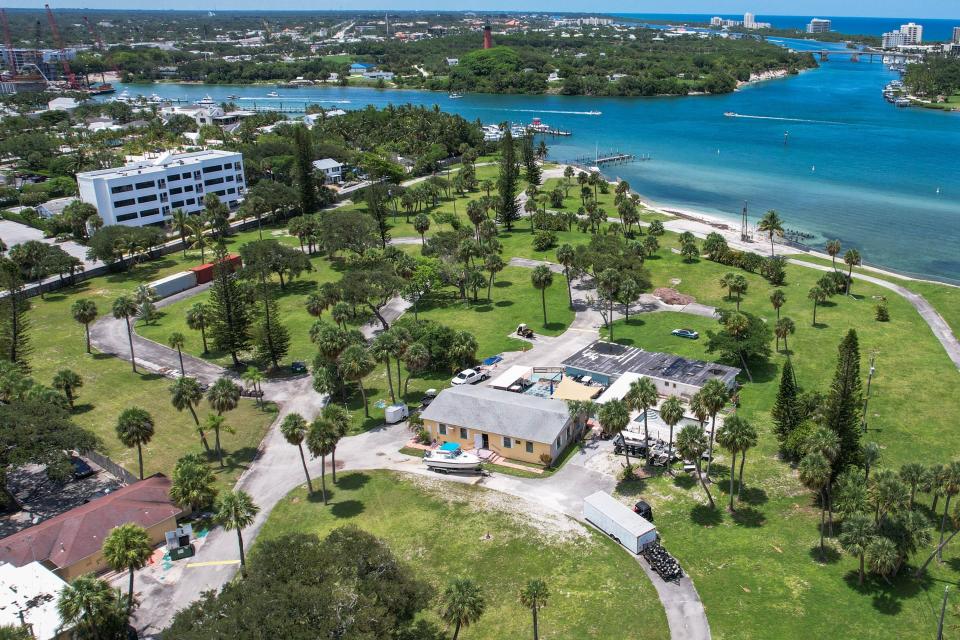Jupiter: Suni Sands developer failed to see waterfront site's historic importance when he bought it
JUPITER — The developer who purchased the 10-acre Suni Sands site along the Loxahatchee River in Jupiter in 2013 failed to recognize its historical significance as noted in the town’s comprehensive plan, Jupiter officials said in a document released Monday.
Suni Sands is known as the first village in Jupiter, where the Jaega and Jobe Native American tribes carved canoes, fished and lived at least 5,000 years ago.
The property’s future has been a contentious issue. Native American Indians want the entire 10 acres preserved and have objected to the disturbance of their ancestor’s burial grounds. A number of local residents and groups such as the Jupiter Inlet Foundation have supported that view. Some chanted “Shame!” and “How dare you?” when the council voted July 25 to preserve only 4 acres of it.
The developer, Charles Modica, has been working to develop the property as a luxury destination. He has said the town council’s action to allow development by issuing a “certificate to dig” on only 6 acres of the property south of the Jupiter Inlet makes his project impossible.
Suni Sands: Jupiter OKs dig over cries of 'Shame!' from those who want historic site preserved
Jupiter's master plan spoke of protecting Suni Sands, town says
Jupiter town attorney Thomas Baird filed a 12-page response to Modica’s appeal of the town council’s decision. The town’s future land-use map and its coastal management policies, spelled out in the comprehensive plan, make it clear the property is a historically significant site meriting protection, he said.
In August, Modica’s attorneys filed an appeal of the council’s decision stating the restrictions make the entire site undevelopable. They requested a hearing before a special magistrate. No hearing date has been set yet.
The council’s move set aside the 4.07-acre Suni Sands Shell Midden, a 10-foot buffer around it and the 950-foot-long, 9.56-foot-wide path where the Celestial Railway ran north-south across the length of the property starting in 1889.
A certificate to dig is needed before any development can begin. No development has been approved for the site.

In the town’s response, Baird said that, under Florida law, the magistrate is to examine the circumstances of whether a development order “unreasonably or unfairly burdens” the property’s use.
The town called Modica’s project “aggressive” and quoted Modica’s justification for the plans.
Modica had stated, “The property is prime for this kind of development given its location on the Loxahatchee River, just minutes from the beach, and continuity to residential neighborhoods.”
Modica went on to say that the proposed inn is meant to be contextual to the history of the property and the surrounding area. The architecture would be inspired by the town’s historic architecture, including the Jupiter Lighthouse and the historic Suni Sands boathouse.
Baird wrote: “This justification underscores the owner’s failure to grasp the archaeological significance of the property and its importance to the settlement of Jupiter. A hotel in the Inlet Village and architecture reminiscent of the Jupiter Lighthouse and Sperry Boathouse may 'feel good,' but this window dressing does little to preserve the property’s archaeological and historical significance to the town.”
From 2016: Last day in paradise: Jupiter’s Suni Sands mobile-home park residents all clear out
The owner’s “investment backed expectations” are based upon proposed amendments to the town’s comprehensive plan and zoning code, along with the approval of a Planned Unit Development and two special exceptions, Baird said.
“The owner’s argument that because of the scope of the CTD (Certificate to Dig) it cannot develop the property consistent with its 'investment backed expectations' is at this point, speculative, because no project has been proposed that is consistent with the existing comprehensive plan or zoning code,” Baird said.
The Fourth District Court of Appeal has made it clear that every resident of a community is intangibly harmed by a town’s failure to comply with its comprehensive plan. The council is entitled to issue a development permit, such as the certificate to dig, that it deems is consistent with its constitution, Baird said.
Evidence found at Suni Sands shows activity thousands of years ago
Modica paid $17 million for the 10.4-acre former mobile home park with the intention of building a 125-room hotel, 72 residences and 12,000 square feet of restaurant and retail space. Just prior to his purchase, the town planning and zoning staff advised him in a letter that the property could be developed.
Modica, a Hobe Sound resident, built the Charlie and Joe’s Love Street restaurant complex just west of the Suni Sands site.
Robert Carr, an archaeologist Modica hired, testified before the town’s Historic Resources Board, “All parties are in agreement that the site is one of the most significant prehistoric sites within the Town of Jupiter.”
During Carr’s investigations of the property, about 4,800 pieces of prehistoric ceramics were excavated. Other significant finds have included an axe made of a type of green stone not found in Florida, indicating trade with other indigenous people,
Carr also found evidence of the property being used for rituals and as a burial ground. In addition, seven human teeth and a patella were unearthed.
The town’s Historic Resources Board recommended the entire 10-acre site be preserved, but the council went against that, voting 3-2 to preserve only the 4 acres. Mayor Jim Kuretski said that Florida law requires the council to balance preservation with the rights of property owners to develop their properties.
This article originally appeared on Palm Beach Post: Suni Sands owner failed to see site's historic importance, Jupiter says

